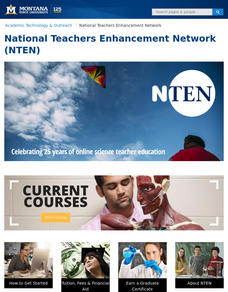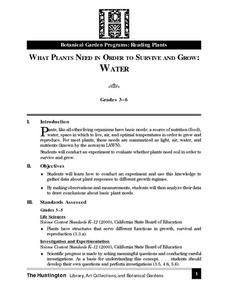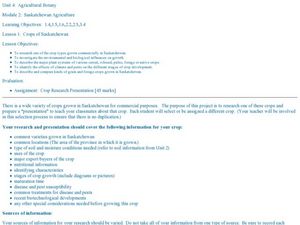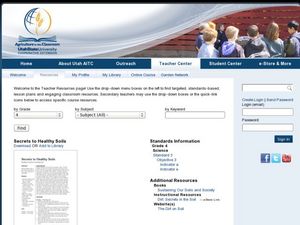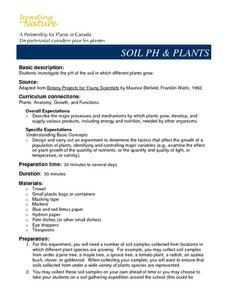Curated OER
Classification/Taxonomy/Statistics Review
"Does King Phillip Cry Over Flimsy Grass Stems?" You might not answer that question with this exhaustive instructional activity, but your biology class will get the full scoop on the hierarchy of biological classification with this...
Southern Nevada Health District
What Am I ?
Have fun learning about fruits and vegetables with a game of pictionary! One team draws a fruit or vegetable on the board, while the other team collaborates to guess what it is. After the game, class members discuss where foods are grown...
Curated OER
Should Soil Be Sterile?
Students determine if the sterilization of topsoil is beneficial to seed germination and plant growth. They grow plants alongside control groups, make and record observations of plant growth and measure plant biomass.
Curated OER
What Plants Need in Order to Survive and Grow: Water
Students conduct an experiment to evaluate whether plants need water to survive and grow. They observe two cactus plants for four weeks, analyzing the results of one plant having received water and the other having received no water.
Curated OER
Investigating Monocots and Dicots
Students know about monocotyledons and dicotyledons. They explore the differences between the seed structure of the two by examining bean and corn seeds. They sprout seed to observe the differences in both of their growths.
Curated OER
Dark Days
Fourth graders investigate the impacts of erosion. In this Science activity, 4th graders determine connections between plants and soil erosion. Students examine the historical implications of erosion.
Curated OER
Crops of Saskatchewan
Young scholars research one of the commercial crops grown in Saskatchewan. For this agriculture lesson, students discover locations, characteristics, common problems, and biotechnological developments related to the crops of Saskatchewan.
Curated OER
Where Do Your Veggies Grow?
First graders investigate the origins of vegetables. In this Science lesson plan, 1st graders identify where fruits and vegetables come from. Students describe how people utilize plants.
Curated OER
Secrets to Healthy Soil
Fourth graders explore needed mineral nutrients for healthy soil. In this soil lesson, 4th graders investigate how living and nonliving elements combine to contribute to fertile soil development.
Curated OER
What Land Works Best?
Fourth graders explore different types of land. In this land lesson, 4th graders investigate how water, climate, and soil type determine what types of crops may be grown. Students discover these elements while playing an interactive game.
Curated OER
Putting on Mass: Just how do Trees grow?
Students articulate an explanation of photosynthesis. They identify problems they have with comprehension of how a plant gains mass. Students describe a historical experiment.
Curated OER
Nutrition: How important is rice to the world?
Fourth graders point out places on a map that grow rice around the world. In this rice growing lesson plan, 4th graders read about the importance of rice and use a map to see where it comes from.
Curated OER
Nutrition and Energy Flow
In this energy flow worksheet, students will complete 10 short answer questions based on a food web diagram. Then students will review different cycles in nature including the water cycle, carbon cycle, and energy cycle. This worksheet...
Brooklyn Children’s Museum
Rocks and Minerals in Our Lives
Young geologists discover the important role that rocks and minerals play in our everyday lives through this series of hands-on activities. Starting off with a lesson that defines the difference between plants, animals, and minerals,...
Agriculture in the Classroom
The Garden Chef
Introduce young chefs to nutritious eating with a cookbook that is divided into sections focusing on one of the five food groups. It includes lessons, activities, and recipes. How wholesome!
Captain Planet Foundation
George Washington Carver and the Sweet Potato
Learn about George Washington Carver's important contributions to agriculture by studying the sweet potato. First graders read about the inventor's observations and prepare sweet potato slips for the class garden. Additionally, they...
Curated OER
The Seed Match
Students examine seeds and predict the plant it comes from. In this seed match lesson, students match seeds to plants and then see if their predictions are correct. Students predict the number of seeds found in plants as well. Students...
Curated OER
Insects!
Students explore the diet of insects. In this "insects" biology lesson, students take a nature walk and collect various natural materials they think may be eaten by insects. Students sort and classify these materials into three diet...
Curated OER
Soil pH & Plants
Young scholars investigate the pH of the soil in which different plants grow. They design and carry out an experiment to determine the factors that affect the growth of a population of plants, identifying and controlling major variables...
Curated OER
Alphabet Letter a Or N Theme
Students draw a tree with acorns. They depict roots and an acorn in the soil to review plant growth and practice handwriting letter A or letter N in the writing lines. They cut an additional page for the mini-book to include the word...
Curated OER
What Plants Need in Order to Survive and Grow: Soil
Learners conduct an experiment to evaluate whether plants need soil to survive and grow. They plant two seeds, one with soil and one without, make predictions, and record and analyze the seed germination results on a worksheet.
Curated OER
King Cotton
Fifth graders explore the cotton plant. For this cotton lesson, 5th graders research the process of growing cotton. Students explore the economic and cultural differences in the states that grew cotton for trade and industry.
NOAA
It's a Roughy Life
Scientists recently discovered several previously unknown species at the Bear Seamount off the coast of New England. Scholars research these new species — benthopelagic, benthic, and seamount fish — and find out what makes them unique....
Horticultural Society of New York
Dress Up Your Salad
Salad dressings use a variety of different ingredients, but it's important to have a healthy balance of greens to create a delicious mix. Young chefs examine five types of herbs including chives, basil, dill, parsley, and thyme to make a...




